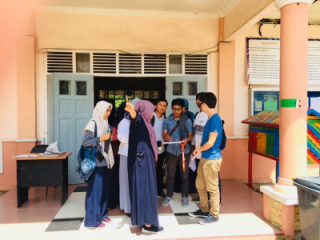This project seeks to foster the resilient recovery of the marginalised communities of Palu, Central Sulawesi, Indonesia, displaced by the 28th September 2018 earthquake and tsunami. During this disaster 184 000 pupils were affected by the damage or collapse of 12 000 schools in Palu and 164 000 people were displaced from their homes. These communities are highly vulnerable and marginalised from decisions made concerning their recovery and it is this marginalisation that this project seeks to address. An interdisciplinary team of academics from the UK and Indonesia are co-developing an innovative intervention that targets psycho-social disaster support, hygiene and the safety of the physical environment, and which centres on schools as hubs for fostering community empowerment. Schools play a major part in shaping future generations and thus a community's future.

The project builds the research capacity of two Indonesian Universities, and the collected evidence will enable them to further their mission of influencing the Indonesian Ministry of Education to implement an effective, compulsory disaster recovery and preparedness program in all Indonesian schools. No such program has been implemented yet, though our Indonesian team in Banda Aceh are at the forefront of devising this. The interdisciplinary evidence base that emerges from the proposed project will ensure that this program is based on sound scientific evidence and knowledge of the local context. The research will not only produce traditional academic output but also practice-based reports and guidelines, which will be developed with the aim of improving the efficiency of future disaster response and resilient recovery programmes.
 Close
Close


